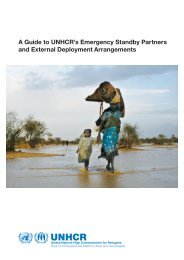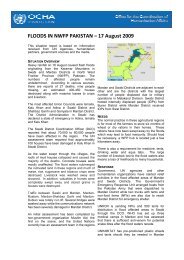Women, Girls, Boys and men - HumanitarianInfo.org
Women, Girls, Boys and men - HumanitarianInfo.org
Women, Girls, Boys and men - HumanitarianInfo.org
You also want an ePaper? Increase the reach of your titles
YUMPU automatically turns print PDFs into web optimized ePapers that Google loves.
Water is essential for life <strong>and</strong> health. In emergencies,<br />
when adequate <strong>and</strong> appropriate water,<br />
sanitation <strong>and</strong> hygiene are not available, major<br />
health hazards can result. The provision of adequate<br />
<strong>and</strong> accessible water, sanitation <strong>and</strong> hygiene therefore<br />
dem<strong>and</strong>s immediate attention from the onset of an emergency.<br />
However, simply providing water <strong>and</strong> sanitation<br />
facilities will not by itself guarantee their optimal use or<br />
impact on public health. Underst<strong>and</strong>ing gender, culture<br />
<strong>and</strong> social relations is absolutely essential in assessing,<br />
designing <strong>and</strong> imple<strong>men</strong>ting an appropriate water, sanitation<br />
<strong>and</strong> hygiene programme that is effective <strong>and</strong> safe<br />
<strong>and</strong> restores the dignity of the affected population.<br />
<strong>Wo<strong>men</strong></strong> are disproportionately affected by emergencies,<br />
in part because of existing gender inequalities. It is important<br />
to involve all members of the community, particularly<br />
wo<strong>men</strong> <strong>and</strong> girls, at all stages of emergency manage<strong>men</strong>t<br />
programmes as they bring valuable perspectives, capabilities<br />
<strong>and</strong> contributions to the emergency response. Gender<br />
balance <strong>and</strong> active involve<strong>men</strong>t of wo<strong>men</strong> <strong>and</strong> <strong>men</strong> in<br />
decision-making in the provision of safe <strong>and</strong> appropriate<br />
water, sanitation <strong>and</strong> hygiene programming is crucial to<br />
adapt to the specific needs <strong>and</strong> include the knowledge of<br />
the entire community.<br />
In many cultures, the responsibility for collecting water<br />
falls to wo<strong>men</strong> <strong>and</strong> children, especially girls. We must<br />
recognize this central role of wo<strong>men</strong> in managing water,<br />
sanitation <strong>and</strong> hygiene. Water points <strong>and</strong> sanitary facilities<br />
should be as close as possible to shelters to reduce collection<br />
<strong>and</strong> waiting time <strong>and</strong> the risk of violence to wo<strong>men</strong><br />
<strong>and</strong> children. Underst<strong>and</strong>ing the special needs of wo<strong>men</strong><br />
<strong>and</strong> girls for sanitary facilities is essential in the selection<br />
<strong>and</strong> design of sanitation facilities <strong>and</strong> programmes, which<br />
are important aspects of promoting dignity.<br />
Effectiveness in reducing public health risks: <strong>Wo<strong>men</strong></strong> are<br />
key actors in influencing the public health of the house-<br />
hold. They are also a huge source of (often untapped)<br />
knowledge regarding the community <strong>and</strong> culture.<br />
Inappropriately designed programmes where key stakeholders,<br />
such as wo<strong>men</strong> <strong>and</strong> children, have not been involved<br />
can result in facilities not being used, or used incorrectly,<br />
putting whole communities at risk of epidemic<br />
disease outbreaks.<br />
the rIght to wAter<br />
?<br />
Have you read section A<br />
genDer AnD wAter,<br />
sAnItAtIon AnD<br />
hygIene In emergencIes<br />
• iCesCr recognizes the right of everyone to an adequate st<strong>and</strong>ard<br />
of living, including the right to water. the right to water<br />
is also inextricably linked to the right to the highest attainable<br />
st<strong>and</strong>ard of health (art. 12) <strong>and</strong> the rights to adequate<br />
housing <strong>and</strong> food (art. 11).<br />
• article 14 of CedaW stipulates that states parties shall<br />
ensure to wo<strong>men</strong> the right to enjoy adequate living conditions,<br />
particularly in relation to water supply. the CrC requires<br />
states parties to combat disease <strong>and</strong> malnutrition<br />
through the provision of adequate nutritious foods <strong>and</strong> clean<br />
drinking water.<br />
• in its General Com<strong>men</strong>t no. 15, the un Committee on economic,<br />
social <strong>and</strong> Cultural rights specified the human right to<br />
water so as to entitle everyone to sufficient, safe, acceptable,<br />
physically accessible <strong>and</strong> affordable water for personal <strong>and</strong><br />
domestic uses.<br />
• the Geneva Conventions guarantee this right in situations of<br />
armed conflict.<br />
• ensuring that everyone has access to adequate sanitation is<br />
not only funda<strong>men</strong>tal for human dignity <strong>and</strong> privacy, but is<br />
one of the principal mechanisms for protecting the quality of<br />
drinking water supplies <strong>and</strong> resources.<br />
Reinforcing <strong>and</strong> reducing inequality: Water, sanitation<br />
<strong>and</strong> hygiene programming has the potential to give a<br />
voice to members of communities who often don’t have<br />
a say. This increased participation of different members<br />
G e n d e R A n d w AT e R , S A n I T AT I o n A n d H y G I e n e I n e m e R G e n C I e S<br />
0<br />
WASh











